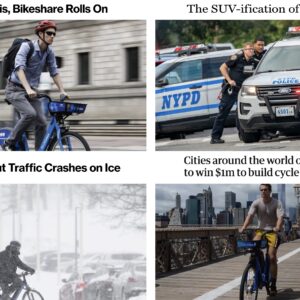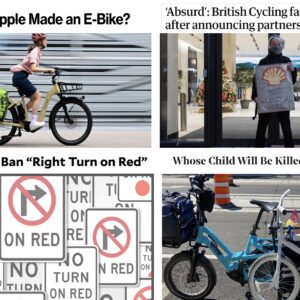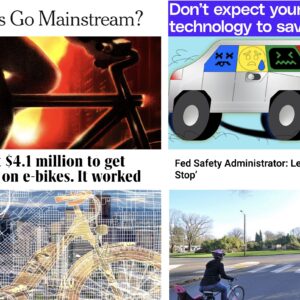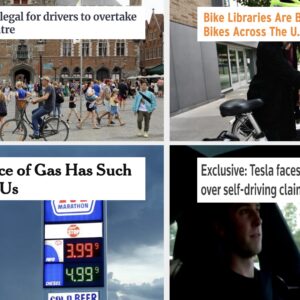Here’s the bike news that caught our eye this week:
– We’d be remiss not to start today’s roundup with a feature about people who found love by bicycle.
– A new study out of Montreal shows that cycle tracks—also known as separated bike lanes—reduce bike related crashes by 28%. Meanwhile, attempts to remove a new, successful cycle track in New York City continue to escalate.
– Bicycles now carry nearly as many people across London’s bridges as private cars do, and are expected to surpass them if numbers of riders continues to grow apace.
– Safety in numbers—the theory that bicycling becomes safer when more people ride bikes—has been borne out in the numbers once again, this time in Minneapolis.
– To make the already bikeable, walkable streets of Strasbourg, France even more friendly, the city is lowering its speed limit to 30km or 18 miles per hour.
– A publisher in Capetown, South Africa thought her city should have a bike map…so she put a GPS unit on her handlebars and made one.
– Long Beach has eliminated its now infamous bicycle registration fee.
– In San Francisco, the number of reported injuries resulting from traffic crashes involving a bicycle went up 7% last year.
– In Florida, recent publicity for bicycling traffic deaths has led to questions about appropriate penalties and a call for empathy and education.
– When you’re bicycling or walking, you’re more likely to be in a crash with a hybrid car than a regular old internal combustion machine.
– On the other hand, if you’re attacked by a leopard, your mountain bike might be what saves your life.
– Texas could be the next state to pass complete streets legislation.
– Los Angeles is getting its first bike corral and perhaps its first bicycle activist on city council.
– Hold on and get ready for a lengthy, opinionated review of the major cargo bikes currently on the market. The 100+ comments are almost as interesting as the article itself.







Thanks for reading.
BikePortland has served this community with independent community journalism since 2005. We rely on subscriptions from readers like you to survive. Your financial support is vital in keeping this valuable resource alive and well.
Please subscribe today to strengthen and expand our work.
My wife and I didn’t meet while riding but our first date was to a bike shop.
The “safety in numbers” correlation is interesting. I’ve always assumed it is solely a result of people driving cars being more cautious and more aware of how to behave around people on bikes, as bikes become more common. Which is probably the primary cause of this correlation, but it might be more than that.
As more switch to cycling as a transportation option, we are getting deeper into the subset of people that are inherently more timid or cautious. Initially, these people probably increase the injury rates, simply because like for all new cyclists there is a learning curve. But then, due to their general level of caution, these people probably bring the injury rate down. Both due to their general safety-oriented mannerisms, as well as their natural selection of inherently safer “low traffic” routes. All in theory, of course. I have not seen any studies mention this effect.
Something that should be considered is that perhaps the percentage of cyclist that report accidents is going down.
Here in Minneapolis I’ve waited over an hour for a police officer to show up to take a report on a right-hook hit and run. How many people give up before that and just go to work if they’re not seriously injured?
interesting, that study showing higher incidence of ped/bike injury crashes involving hybrids. they seem to come to the conclusion that its a noise issue – ie that the hybrid engines comparative silence is the culprit – yet the scenarios in which they cite crashes (mostly low-speed scenarios – backing, pulling into parking spaces, things of that ilk) are *exactly* the scenarios in which ive come to the conclusion (completely unscientifically, mind you – but i spend a LOT of time riding in traffic gathering my unscientific data 🙂 ) that the average driver of a hybrid or electric car is FAR more tentative, lacking in confidence, erratic and unpredictable than typical for other drivers. man, what a run-on sentence. but in all seriousness, after nearly 200k miles on a bike in traffic, you begin to establish certain stereotypes about certain types of cars and how they are driven – and mine for hybrids and electrics is that theyre driven *badly*. the most dangerous drivers on the road, in my humble opinion, silent engines or not.
I think its an absolutely amazing idea to reduce the city speed limit Strasbourg, France to 18mph. Life would be so much more enjoyable for everyone.
I found love by bicycle – I’m dating the ER nurse who tended to my injuries after a crash. I haven’t seen my trainer since I gave her a bike for Christmas.